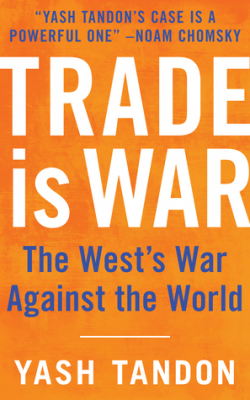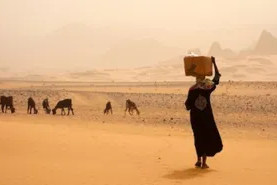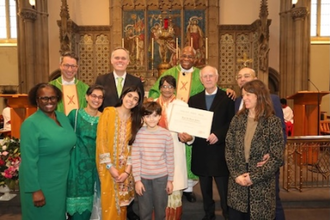Book: Trade is War

Trade is War by Yash Tandon, OR Books.
Trade wars and tariffs are in the news, thanks to President Trump's populist protectionism. However, readers of ICN are probably already well aware of the moral arguments surrounding trade. The wealthy world's trade policies have had a devastating effect on the developing world. This timely book explains how the US and EU subsidise their agriculture, and then dump their surplus production on poor countries. Through the World Bank, the World Trade Organisation, the International Monetary Fund and sundry trade agreements, the rich world insists it has access to global markets, while ignoring its own track record of subsidising its industries and agriculture for decades.
Where many people see Western hypocrisy, Yash Tandon, the author of Trade is War, sees a conspiracy to keep poor countries from industrialising and thus competing against the West. He also believes these powerful international financial organisations have an ulterior motive: providing a military alliance against the countries that do not bow to American hegemony eg Russia, China, Zimbabwe, Venezuela, Iran and Cuba.
Tandon is a Ugandan with long experience of both campaigning and advising the global South during trade talks. He marshals his arguments against the West robustly. He also concedes that many African leaders have not even read the trade conventions they sign, and that corruption is a continent-wide problem. Yet, he says, leaders are pressured by the threat of having their aid cancelled. He also believes Africa hasn't industrialised because intellectual property laws and copyrights prevent Western processes being used across the continent. Those of us with experience of working in Africa might suggest there is also a deficit of managerial skills, coupled with low productivity and poor infrastructure.
Most problematic is Tandon's failure to examine China's enormous economic impact on Africa. In too many cases China offers long term loans on condition that vanity projects of dubious value are awarded to Chinese contractors without environmental impact assessments or competitive tendering. While the African elite benefit from these deals, few local people are employed or trained. Nor will the broader African public benefit from empty conference centres or roads connecting mines with ports. Tandon also ignores the way in which Africa's manufacturing base has been decimated by the deliberate dumping of Chinese goods on their markets at below cost, crippling local producers.
Instead, the author praises China for its ostensible policy of non-interference, saying of China's close relationship with the Sudanese regime (whose leading lights have been indicted for genocide in Darfur by the International Criminal Court), "it is for the Sudanese to resolve." Would Tandon have taken the same view of South Africa under apartheid?
The author believes Russia and China use their veto power at the UN to "save the South from being pushed around," and writes that calls for democracy, freedom of the press and good governance are tools used by the West to fight what amounts to a war against the South. Brave campaigners in Myanmar, Ethiopia, Eritrea, Sudan, and the Arab world, etc., might beg to differ.
His failure to mention the slaughter of 20,000 Zimbabweans in Matabeleland (as he praises the ZANU-PF), or the repression of Christians and gay people in Cuba might also raise a few eyebrows. He claims the U.K. has made "a big hoo-ha about the threat Russia poses to their security," that there is no evidence Russia interfered in the 2016 US election, and that Hillary Clinton is no better than Donald Trump anyway.
Given this worldview, he proposes that thousands of non-violent communities should become self-reliant, organising their own methods of production and consumption, trading with each other. Capitalism cannot be regulated, he claims, so it must be ignored.
In this volume, Tandon makes many valid points about the way in which trade and tariffs hold back the global South. Readers will reach their own conclusions about how realistic his answers are.


















